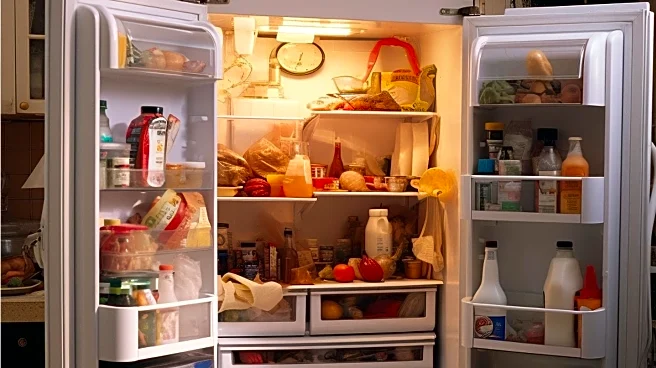What is the story about?
What's Happening?
Food scientists have identified overstuffing refrigerators as a common issue that can lead to uneven cooling and spoilage of groceries. When a refrigerator is packed beyond capacity, airflow is restricted, causing internal temperatures to rise and become uneven. This can result in certain areas of the fridge becoming warmer, creating 'hot spots' where bacterial growth can occur rapidly, leading to food spoilage and potential food poisoning. Experts recommend keeping the fridge about two-thirds full to ensure proper air circulation and stable temperatures. Additionally, storing items like dairy and eggs on middle shelves, rather than in the door or back corners, can help maintain their freshness.
Why It's Important?
The implications of improper refrigerator use are significant for food safety and household economics. Spoiled food not only poses health risks but also leads to financial waste, which is particularly concerning in the current economic climate. By understanding the risks associated with overstuffing refrigerators, consumers can take steps to prevent food spoilage and reduce waste. This knowledge is crucial for maintaining food safety standards and ensuring that households can maximize the longevity and quality of their groceries.
What's Next?
Consumers are encouraged to reassess how they organize their refrigerators to prevent overstuffing. Implementing practices such as 'first in, first out' can help reduce waste and improve food safety. Additionally, purchasing inexpensive thermometers to monitor temperature variations within the fridge can aid in identifying and addressing 'hot spots.' These steps can help households maintain optimal food storage conditions and prevent spoilage.
Beyond the Headlines
The issue of refrigerator overstuffing highlights broader concerns about food storage practices and consumer awareness. It underscores the importance of educating the public on effective food preservation techniques and the potential health risks associated with improper storage. This knowledge can contribute to more sustainable consumption patterns and reduce the environmental impact of food waste.















